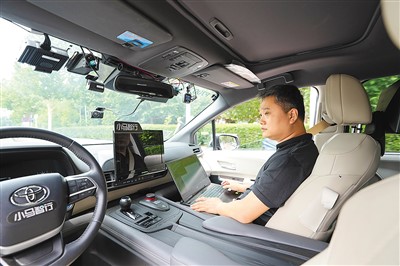China’s “vehicle-road-cloud” integration continues to develop with city-based pilot program
Recently, China’s Ministry of Industry and Information Technology (MIIT) and four other central government departments selected 20 cities and consortiums as participants in a pilot program for the application of “vehicle-road-cloud” integration for intelligent connected vehicles (ICVs).
Some of the selected cities are Beijing, Shanghai, Guangzhou, Shenzhen, Chongqing, Chengdu, Nanjing, and Wuhan.

Wang Wei, an operation and maintenance personnel for intelligent connected vehicles, conducts road testing for an autonomous vehicle at an autonomous driving demonstration area in Yizhuang, Beijing. (Xinhua/Ju Huanzong)
Widespread application of “vehicle-road-cloud” integration
“Vehicle-road-cloud” integration uses next-generation information and communication technologies to integrate physical information about people, vehicles, and roads with the cloud to ensure the safe, energy-efficient, comfortable, and efficient operation of ICVs.
Since the beginning of this year, Beijing has granted permits to operate an autonomous taxi test service at Beijing Daxing International Airport, Beijing South Railway Station, and other major transportation hubs in the city. In late June, an autonomous shuttle service was launched at Beijing Daxing International Airport. At present, the total area of the Beijing High-Level Automated Driving Demonstration Area has reached 160 square kilometers.
“We are accelerating the expansion of the automated driving area to 440 square kilometers and promoting the opening of key venues like airports and railway stations to create a ‘Beijing model’ for the large-scale deployment of ‘vehicle-road-cloud’ integration for ICVs,” said a representative from the Beijing High-Level Autonomous Driving Demonstration Area.
In addition, the “vehicle-road-cloud” integration concept has a wide range of commercial applications in fields including public transit, smart sanitation, autonomous delivery, and intelligent connected passenger vehicles, according to industry insiders.
The pilot program aims to accelerate the development of urban and road infrastructure, increase adoption of in-vehicle terminals, and explore new technologies and business models, said an official with the MIIT.
Wang Peng, associate researcher with the Beijing Academy of Social Sciences, said “vehicle-road-cloud” integration will help provide more comprehensive and accurate environmental perception and decision-making capabilities for vehicles, offering a "Chinese solution" to the development of autonomous driving.
Demonstration projects began in pilot cities and consortiums
The cities and consortiums were selected based on their strong foundations and early start in “vehicle-road-cloud” related efforts.
For example, Beijing took the initiative to establish the world’s first high-level autonomous driving demonstration zone for the application of “vehicle-road-cloud” integration in September 2020. Autonomous vehicles have become a common sight on the streets of Yizhuang in Beijing, and intelligent connected vehicles have been promoted in more districts of the capital city.
In addition to Beijing, many of the pilot cities have already launched demonstration projects for “vehicle-road-cloud” integration. Wuhan, for instance, received approval for a major demonstration project for “vehicle-road-cloud” integration with an investment of 17 billion yuan ($2.34 billion) in June. The Hangzhou-Tongxiang-Deqing consortium has also stepped up, with each area adopting various technologies to promote and develop demonstration zones for “vehicle-road-cloud” integration.
The pilot cities will build low-latency and reliable cloud control infrastructure, promote the large-scale application of autonomous driving under multiple scenarios, explore a new interest-sharing business model with state-owned platforms, carmakers, operators and technology companies, and form a unified test evaluation system.
From testing to large scale applications
Some institutions believe that by 2030, the Chinese ICV market could exceed 5 trillion yuan, with the related market of “vehicle-road-cloud” integration reaching 14 trillion yuan.
According to Wang, “vehicle-road-cloud” integration is at a critical period where it is transitioning from testing and validation to large scale applications. This requires addressing challenges like insufficient coverage of intelligent roadside infrastructure, low onboard terminal installation rates, and unclear business models.
These challenges can be met by clear plans for funding required for the needed research and infrastructure construction. Through coordination between the different pilot programs, this can be accomplished.
Currently, there are 17 national-level demonstration bases to test ICVs, seven national pilot zones for testing the internet of vehicles, and 16 pilot cities for the coordinated development of smart city infrastructure and ICVs across China. It has opened up over 32,000 kilometers of roads for testing, with over 7,700 test licenses issued and more than 120 million kilometers of test mileage completed. In addition, over 8,700 sets of intelligent road side units have been deployed across the country.
The pilot program will fully leverage previous achievements to promote the large-scale application of “vehicle-road-cloud” integration for intelligent connected vehicles, said an official with the MIIT.
Photos
Related Stories
Copyright © 2024 People's Daily Online. All Rights Reserved.









